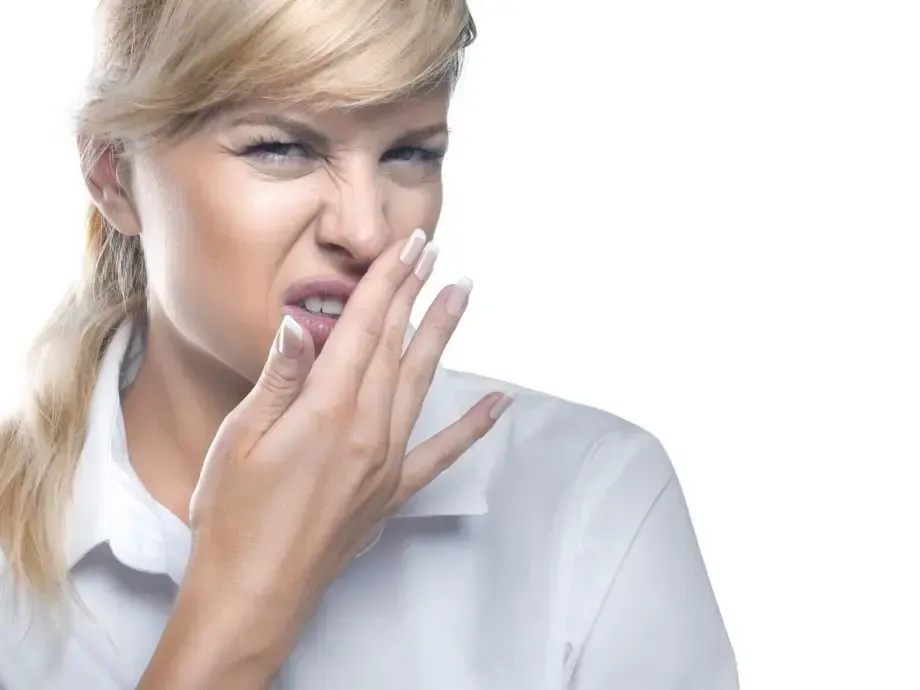Top 10 Causes of Bad Breath and How to Prevent It

Even though we’ve all experienced bad breath at some time in our lives, it’s still embarrassing to deal with. You might notice coworkers backing away in conversation, your partner quickly offering a cheek when you go in for a peck on the mouth—or maybe you’re a parent with kids who are unafraid to loudly announce, “You have bad breath!” The good news is that many of the causes of bad breath have simple fixes. Here are the most common reasons why patients have bad breath.
1. The Food You Eat
We’d never expect you to give up your favorite garlicky foods, but the trade-off is that you can expect bad breath for some time afterwards. This goes for onions and certain spices too. Once digested, compounds from these foods enter your bloodstream and are transported to the lungs, impacting your breath.
2. Tobacco Use
We’d never expect you to give up your favorite garlicky foods, but the trade-off is that you can expect bad breath for some time afterwards. This goes for onions and certain spices too. Once digested, compounds from these foods enter your bloodstream and are transported to the lungs, impacting your breath.
3. Bad Brushing and Flossing Habits
Bits of food particles accumulate in and around your teeth throughout the day. These particles attract bacteria, which breaks down the food and causes odor. If you don’t floss, this plaque remains between your teeth even after brushing. Be sure to brush your tongue too—it can also cause bad breath.
4. Dry Mouth
Our saliva works throughout the day to rinse away food particles and bacteria. If you have dry mouth, this process doesn’t occur, resulting in bad breath. That’s why after waking up in the morning, most of us have bad breath that goes away after we rehydrate.
5. Certain Medications
Many medications cause dry mouth, a precursor to bad breath, but they may also break down in the body and release chemicals into the bloodstream. Just like with garlic and onions, these chemicals travel to the lungs and can be carried on the breath.
6. Gum Disease
Gum disease is a common cause of bad breath. When you have gum disease, pockets form between your teeth and gums. Food debris and bacteria collect in these pockets, causing a foul odor. Pockets cannot be cleaned by regular brushing and flossing, so the only treatment for bad breath when gum disease is the cause is by eliminating the pockets and reversing the disease.
7. Tooth Decay
Tooth decay is the result of infection; as decay progresses, the tooth can begin to emit a foul odor.
8. Allergies and Sinus Infections
Allergies and sinus infections can cause postnasal drip, a condition in which mucus runs down the back of the throat, causing bad breath in the process.
9. Tonsil Stones
If your tonsils have craters in them, you may suffer from tonsil stones. These stones, also called tonsilliths, are made up of food particles, bacteria, and other calcified debris. Even if you can’t see them, these stones can cause bad breath that is not alleviated by brushing and flossing.
10. Medical Conditions
Certain cancers, metabolic disorders, and gastric reflux can all cause bad breath too.
Preventing Bad Breath
Some causes of bad breath are easier to treat than others. If you’re on a medication that causes bad breath, you may not be able to stop taking it or switch to an alternative; if you have allergies, finding an effective treatment might be a struggle. Simple steps you can take to prevent bad breath include:
- Brushing for two minutes twice a day and flossing at least once a day.
- If you smoke or use chewing tobacco, stop.
- If you suffer from dry mouth, drink more water throughout the day and avoid mouthwashes that contain alcohol.
- Visit the dentist every six months for preventive dental care to protect against gum disease and tooth decay.
Schedule an Appointment
Are you concerned that you have bad breath? Contact us today at 818-348-6068 to schedule an appointment. We’ll help identify the source of your bad breath and come up with a treatment plan.


